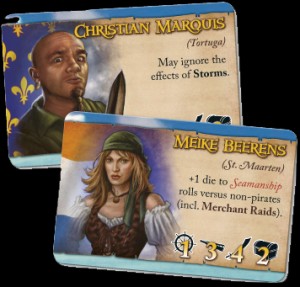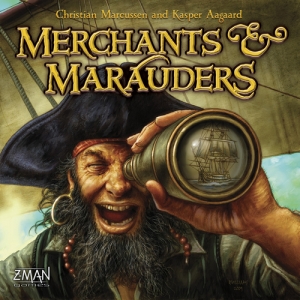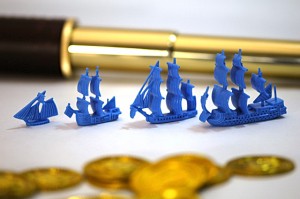Review: Merchants & Marauders
Posted by James (admin) on October 30th, 2010
 There have been a lot of pirate-themed games in the past but not many have covered the full pirate experience. To make it worse, the Sid Meyer’s Pirates boardgame never made it to completion. So, when I read the rules to Merchants & Marauders, I was very pleased that a big Pirate game was coming.
There have been a lot of pirate-themed games in the past but not many have covered the full pirate experience. To make it worse, the Sid Meyer’s Pirates boardgame never made it to completion. So, when I read the rules to Merchants & Marauders, I was very pleased that a big Pirate game was coming.
THE GAME
The goal of Merchants & Marauders is glory – the first player to score 10 glory points wins. Each time a player gains a glory point, they also receive a glory card too which is a special ability or item, so your captain becomes more accomplished throughout the game. Glory is gained through impressive feats such as defeating a ship in combat, trading large amounts of goods, completing missions, gaining wealth, and more.
The board shows the Caribbean split into sea zones – each zone contains a port, plus has a special rule too making every zone different. For example, one zone allows a player to buy new ships cheaper and transfer upgrades from your old ship. Each zone belongs to one of the 4 nationalities (English, Dutch, French, Spanish) – an important factor if you start racking up bounties on your head because they won’t let you enter their ports. As well as players’ ships, non-player merchant ships and nations’ naval vessels start to appear throughout the game. Also, there are always 2 missions on the board which will earn glory or cash for the first player to perform them. Missions can be simple like sorting out some restless natives to gun smuggling runs; however, some have requirements which a player must meet to be eligible to complete them.
Captains & Ships
At the start of the game, each player is given a captain from the large deck of captain cards. Each captain has stats (used for skill checks) which predispose them towards a life of trade or piracy, but the player can do what they want. Also, each captain has a special ability too. The player picks one of the two starting ships (the fast light ship, or the slower cargo vessel) which also have stats (toughness, crew, cannon and manoeuvrability). If your captain is killed, I like how you get a new captain and ship plus you keep all your glory cards and points (but lose ship upgrades, cash, etc).
 Actions
Actions
Each turn a player can perform a total of 3 actions. Possible actions are: Move, Search and Port. A Move action moves your ship to an adjacent sea zone, or into or out of a port. A Search action allows a player to try and find other ships (player or non-player) in their zone resulting in an attack if they find them. A Port action allows a player to perform many activities such as recruiting crew, buying and selling goods, find rumours, attempt missions, buying ship upgrades – some port actions are free if the player succeeds at a skill check.
Buying & Selling
I won’t go into every detail of the Port action but will mention the trading aspect as this is especially key for players who are being merchants. A player buying goods draws 6 cargo cards and each costs 3 gold each; however, the price is lower if the player has drawn multiple goods of the same type. If you buy multiple items you must show one other player so they can confirm your discount (probably best not to show a pirate). Goods can be sold at other ports for 3 gold each; however, each port has one good that is ‘in demand’ and these can be sold for 6 gold each. The good ‘in demand’ at a port changes when a player sells that good at the port. The amount of goods a player can transport is limited by their ship’s cargo stat.
Merchant or Marauder
As I mentioned, players can choose whether to perform acts of piracy or not. I played primarily as a merchant although I did raid a Spanish merchant (non-player) vessel. This placed a Spanish bounty on my head by which meant Spanish naval vessels would try to attack me if nearby, plus I wouldn’t be able to use Spanish ports, but it was fun and gained me some cargo and gold. Whilst piracy may close off some options to you, it opens others and I really like how the balance is totally up to the player.
Stashing Cash
Rather than sail around with all their cash on board, players can secretly stash their gold at their home port. Every 10 gold stashed is worth 1 glory point, although a player can only earn a maximum of 5 glory points this way. Each player has a 3-D card treasure chest with a slot in it which they physically hide their money in like a piggy bank. The treasure chest itself is very cool and really nicely designed. At any port, a player can buy one of the two big ships for 35 gold. These are serious ships and both the attack and cargo ships are very powerful. The NPC Man-of-War naval ships are even more powerful but these can only be gained by attacking them and defeating them in battle with a boarding action.
Events, Rumours & Skill Checks
After each player has had a turn, an event card is drawn which have different effects. Many event cards introduce NPC ships onto the board as well as move some of the NPC ships already on the board. Each type of NPC ship moves based on a set of rule, i.e. go after pirates, enemies of its nation, etc.
As well as missions, players can seek out rumours at ports which are like personal, secret missions. If a player succeeds at a rumour they get the reward, but if they fail then the rumour has proven to be false and is discarded. Just looking for a rumour costs 2 gold so they can prove expensive, but are great when they work out.
When a skill check is required, the player rolls a number of dice equal to their skill and they just need one success (a 5 or a 6 depicted by a skull). Some players may find this luck element too great for them but it’s easy to assess your odds so I found it okay.
 THOUGHTS
THOUGHTS
Overall, I really enjoyed Merchants & Marauders. All the main pirate activities are available and you really can choose any mixture of piracy and trading that you want; however, there’s also depth and variety too. The amount of cards in the glory, mission, captain and event decks is really encouraging and will give the game good variety on replays. It reminds of a FantasyFlight Game like Arkham Horror. You can earn glory points in quite a few different ways too which further increases the ability to choose your own destiny.
Whilst the variety and choice delivers a big game, it plays relatively quickly. The only time it slows down is when a player performs a port action due to the multiple activities available, but even this doesn’t take very long once the players are familiar with the options.
The visual quality of the game is superb. The board is colourful and looks great, the card chests are excellent, and the ships are all represented by plastic models – plus, there’s a different model for each different ship type (and in every player colour). The rules for each zone are written in text on the board but these aren’t too intrusive and are useful as the rules are so varied. The only downside to the text is that it may be difficult for players who aren’t sitting the right side of the board.
The one thing we didn’t see in our game was ship-to-ship combat which was a shame. (The reason for this is that the pirate player carried out merchant raids which are carried out differently and the game ended before they had a chance to attack bigger prey). However, the combat rules sound good as they’re relatively simple and require some commitment to an action prior to finding out which player is successful; for example, a player can choose to shoot, board or flee before they roll to find out which ship gets to perform their chosen action.
 In our game, the player who was a full-on pirate found it more difficult to gain glory than the merchant players as their merchant raids didn’t result in glory. It will be interesting to see how this plays out in future. I have a theory that if you follow the piracy route then it’s almost your job to attack the other players who are softer targets until the larger naval vessels are more approachable. Completing missions is an important source of glory too.
In our game, the player who was a full-on pirate found it more difficult to gain glory than the merchant players as their merchant raids didn’t result in glory. It will be interesting to see how this plays out in future. I have a theory that if you follow the piracy route then it’s almost your job to attack the other players who are softer targets until the larger naval vessels are more approachable. Completing missions is an important source of glory too.
The NPC ships didn’t move much so were relatively easy to avoid, but I think this was just because of an unusual draw of event cards. With fewer players, I wondered if a few NPCs should start on the board to populate it a bit more, especially so they could offer weaker targets for players.
One thing that seemed a bit odd to me was that a slow-moving, island-hopping (leave port, next sea zone, enter port) merchant player can be almost impervious to attacks from other players. This seemed quite powerful and I wonder if entering a sea zone where another player is located should give them a chance to search and intercept you – I’ll know if this is required after a few more plays and I try playing the piracy approach.
In conclusion, the name Merchants & Marauders is perfect for the game as you can play at either extreme, or anywhere in-between. It was really good fun with options, variety, enough depth and delivered on the pirate theme. I think it will play best with more players (it plays up to 4) so that there’s more chance to interact but 2 player would still be fun. An excellent gamer’s pirate game.
Note: Read more insights into Merchants & Marauders in my Replay article.
James.
[Played with 3 players]
P.S. Kuznia Gier’s Pirates: The Governor’s Daughter has also been released too which has a similar scope but very different game mechanics. Soon as I play Pirates: The Governor’s Daughter I shall post a review and draw some comparisons too.


November 15th, 2010 at 7:56 am
Please post another review after a few more games playing as a full on Pirate, I dislike the invulnerable merchant tactic of moving from port to port in one bound too but suspect it might be too slow to really prove reliable a win…
Enjoy your take regardless…
November 16th, 2010 at 1:46 am
I agree entirely. The slow port-to-port hopping is a disappointing tactic should a player choose it – and a bit boring for the player too. It would slow a player down a lot as a player can only leave port, move to a new sea zone and then enter port during one turn with no time to do port actions like buy and sell goods. So, a player who wants totally safe (and short) movement would have to not move at all during a turn if they want to do any trading, ship upgrading, etc. So, I think you’re right that it may be too slow. I hope to play Merchants & Marauders again this weekend so will post about it after I do. Cheers.
November 20th, 2010 at 9:15 pm
Hi guys… You can check out this *beta* variant if you feel it’s an issue.
http://www.boardgamegeek.com/thread/586759/cutthroat-variant-beta
November 22nd, 2010 at 2:19 am
Hi Christian,
Thanks. It sounds like a really good idea. It adds some way of stopping players island hopping in total safety i.e. leave port, move zone, enter port. I’ll try it out next time I play.
I played Merchants & Marauders again yesterday and tried your suggestion about using special weapons to make Merchant Raids easier for the pirate player. It still seems very difficult for a player to start out as a pirate though. Having played the game more, I’ve added a new article (Replay) with some further thoughts. I’d love to hear your feedback, especially about the sloop.
Cheers,
James.
November 22nd, 2010 at 1:44 pm
Hi James… Glad you are still enjoying the game.
“Even attacking another player who has a flute (the main ship choice for merchants) is troublesome because they can take a lot more damage and can fire more cannons if they do get to open fire.”
What do you mean they get to fire more cannons? Anyway all things being equal you ought defeat a Flute at least 2/3 of the time. Two points
1) Remember you have one extra dice in your Seamanship roll vs a Flute (since your sloops Man is two larger then the Flute)
2) Pack some Grapeshots. This will allow you do eliminate the Flutes crew with over 50% certainty if you hit with your cannons. Then all you need to do is board the Flute. In other words don’t get into a prolonged cannon fight.
If you keep feeling that its too hard for the pirate, then you could lower the plunder needed to say 11. But you can try do some Merchant raid tests to practice when it’s a good idea to spend your Special Weapons and when it is not. With a little practice you should be able to score a Glory Point from around half your merchant raids.
Cheers
November 22nd, 2010 at 2:54 pm
Hi Christian,
My apologies. You’re absolutely right, of course, that the flute don’t fire more cannons as they have 1 cannon (the same as the sloop). I was mistakenly thinking about our game when all the other players had upgraded to galleons which have 3 cannon and I still had the sloop. So, I was outgunned and didn’t get the maneuvre bonus. I have updated my replay post to reflect this.
It still seems faster to earn gold through trading than through merchant raids (and trying to attack players) so I don’t think I’m sold on the sloop yet, but that may just be my preference. Thanks for the tactical advice – it’s very interesting. Next time, I think I shall first trade (using a flute) to get a bigger ship and then maybe turn pirate after that.
With such a great game now published, are you working on another game (or an expansion for Merchants & Marauders)?
Cheers,
James.
November 23rd, 2010 at 10:58 pm
So far, Pirate’s Cove is the best pirate game that I have played, but from your review this one sounds like it would beat that. Can you speak to your thoughts on which one you like better (if you’ve played them both)? Also, you said this game didn’t take too long. Roughly how long does it play in?
November 23rd, 2010 at 11:10 pm
Hi Josh. I haven’t played Pirate’s Cove so, unfortuately, I’m not able to comment on the comparison of the two. I believe our games took around 30 minutes per player. There’s not much downtime between turns either, unless there’s a ship battle but those are fun to watch (and one player takes the role of the non-player captain so 2 players are involved in any fighting).
November 25th, 2010 at 8:49 pm
Thanks for the info on the time frame. 30 minutes per player sounds quite manageable, especially for the depth level that it sounds like this game has. Now I need to look for a copy to try out myself!
January 12th, 2011 at 6:22 pm
Remember movement requires a point to move from port to sea, then sea to sea, then another back to port. The port action is another point. They’ll have to spend a turn just moving to stay safe and only do port activities every other turn; which is slow, boring, and likely something that will make them lose. They’ll have to do missions or chase rumors, or even become a pirate themselves in at least merchant raids, to keep up with any hope of winning 😉
January 12th, 2011 at 8:56 pm
I agree, it’d definitely be hard to win by moving safely between ports as it’s very slow. It’s a bit of a shame though that a player can always ‘go to ground’ this way when enemies are nearby though; however, it’s not too bad and it doesn’t break the game. The extra optional rule variant looks good though as it allows a player to attack another player as they pass through their location, but at the cost of only getting 1 action (not 3) when it’s their turn. I like the opportunity and the balance that comes with it.